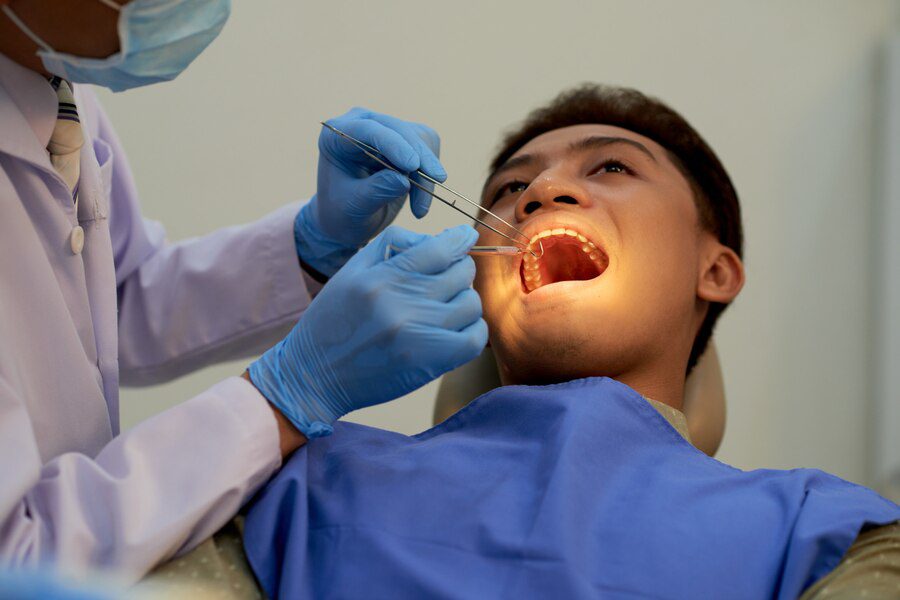Gum disease also known as periodontal disease, is caused by the buildup of plaque, which leads to inflammation of the gum. If it is left untreated, it can progress and damage the gums and may lead to tooth loss.
Can you still save your gum?


So you want to know if you can still redeem your teeth. Well, there is one question you need to answer, how long has it been like this? There is a stage periodontal disease will get to, that may cause a person to lose their teeth.
Now wait, don’t freak out, you don’t know how bad it is yet, but I’m going to help you understand better okay? So no pressure. Besides, periodontal disease can be managed and treated at any stage. However, early detection and intervention will always take the cake in preventing long-term damage and tooth loss.
Key takeaway
When it is too late to reverse gum disease
Stages of periodontal disease
Treatments for different stages of periodontal disease
Prevention strategies
When is it too late to reverse gum disease? (How far is too far)
If gum disease is left untreated and progresses to advanced stages, it can lead to serious complications like tooth loss and damage to the supporting structures of the teeth. In some cases, gum disease progression has severe symptoms that can occur over a few months, but it can vary for each person.
And when you begin to have these symptoms, get help immediately, there may still be time to solve this problem.
What are the symptoms of advanced gum disease?
Some things happen when periodontal disease has gone too far.
Here are some common symptoms:
- severe gum inflammation
- gum recession
- loose teeth
- pus between the teeth and gums
- persistent bad breath
- changes in biting food (pain when you eat)
- Shaky tooth and even tooth loss
When these symptoms occur, it may mean a lot for the person. if you notice these signs, you must get the help you need. So that you can prevent further damage to your oral health.
Stages of periodontal disease
There are different stages of periodontal disease, and each stage could mean something to you. It’ll help you understand more things and help you make confident decisions.
1. Gingivitis
This is the mildest stage of periodontal disease, which is linked to the gums (gingiva) inflammation caused by plaque buildup on the teeth. Symptoms include red, swollen, and bleeding gums, but the bone and tissue that hold the teeth in place are not yet affected.
2. Early periodontitis
At this stage, the inflammation has spread beyond the gums and started to affect the bone and tissue that support the teeth. The periodontal pockets (spaces between the teeth and gums) deepen, and the bone begins to break down.
3. Moderate periodontitis
As the disease progresses, the periodontal pockets deepen further, and the bone loss becomes more pronounced. Your teeth may start to feel slightly loose, and the gums may recede, exposing some of your tooth’s roots.
4. Advanced periodontitis
This is the most severe stage of gum disease where significant bone loss occurs, leading to tooth mobility and potential tooth loss.
5. Periodontal abscess
This is a complication of advanced periodontitis, where a pocket of pus forms in the periodontal pocket, causing pain, swelling, and further tissue damage.
Treatments for different stages of periodontal disease
1 . Deep dental cleaning, which includes scaling and root planing to remove plaque and tartar and smooth out the root surfaces.
2 . Medications include topical antibiotics, antimicrobial mouth rinse, antiseptic chips, and enzyme suppressants.
3 . Surgical treatments, including pocket reduction surgery, soft tissue grafts, bone grafting, and guided tissue regeneration.
4 . Laser treatment to target bacteria and reduce inflammation.
5 . Bone and tissue grafts to regenerate lost bone and tissue.
6 . Flap surgery to clean deep pockets and reduce bone loss.
Prevention strategies for advanced gum disease
- Brush your teeth after meals to remove food debris and plaque. Don’t forget to brush your tongue.
- Floss at least once a day to remove food particles and plaque between your teeth and along the gum line.
- Use mouth rinse to help reduce plaque between your teeth.
- Follow a healthy diet.
- Brush your teeth twice a day or after every meal or snack.
- Use a soft toothbrush and replace it every three months.
- Avoid smoking or chewing tobacco.
- Consider using an electric toothbrush.
- Attend regular dental check-ups
What foods to stop eating after a case of advanced gum disease
Here are the foods to avoid after dealing with advanced gum disease:
1. Sugary and sticky foods that can contribute to plaque buildup, and result in gum disease.
2. Acidic foods and beverages that can irritate sensitive gums.
3. Foods high in processed sugars and unhealthy fats that can worsen inflammation and cause gum diseae.
4. Hard and crunchy foods that may aggravate tender gums.
5. Carbonated drinks that can be high in sugar and acidity.
6. Alcohol, which can irritate the gums and contribute to inflammation.
7. Processed snacks like chips and cookies that are high in sugar and unhealthy fats.
8. Spicy foods may cause discomfort or irritation to sensitive gums.
14 precise foods to avoid gum disease
- Potato chips
- Candy
- Fruit juice
- Dried fruit
- Coffee
- Popcorn
- Cake
- Chocolate
- Pasta
- White bread
- Tomatoes
- Cold drinks
- Ice cream
- Oranges
General dental care tips
Some common dental care mistakes you should avoid include, forgetting to brush or floss regularly, using the wrong brushing technique, skipping dental check-ups, not replacing your toothbrush often enough, and using a mouthwash containing alcohol excessively. By avoiding these mistakes, you can better maintain your oral health, and prevent gum disease.
How to pick the perfect toothbrush
When selecting a toothbrush, it’s essential to consider the size of the brush head, the bristle type (soft, medium, or hard), and the handle grip for comfort. Go for a toothbrush with soft bristles to avoid damaging your gums and enamel. And remember to replace your toothbrush every 3-4 months or sooner if the bristles fray.
These articles will help you know more about dental issues.
Osseous surgery: Purpose, benefits, procedure, pain, recovery
The Difference between Tooth Scaling and Root planing in 2024
Straight Talk: Transforming Crooked Teeth for a Confident Smile.
Message from Medspurs
Gum disease can still be treated and managed, despite the stage it is in. However, there may be cases where you may have to remove a tooth, for safety reasons. You must practice all the dental care tips mentioned above. You’re the only one who can protect your dental health, and prevent gum disease, so make sure you do that!
Frequently asked questions
What happens when a person has chronic gum disease and has to take out their tooth?
If someone has chronic gum disease and needs to have their teeth removed, it can significantly impact their oral health and quality of life. It may affect their confidence and ability to socialize better, due to being self-aware of their current oral situation. This can be very heartbreaking, but it doesn’t define a person. Overall, it is essential to address gum disease early to prevent such serious outcomes.
What options are there if a person has to take out a tooth?
If someone has chronic gum disease and needs to have their teeth removed, they may explore options like dental implants, bridges, or dentures to restore their smile and oral health. It’s important to discuss these options with a dental professional to determine the best solution for your needs.
How long does it take to get dental implants after teeth removal?
It typically takes a few months after teeth removal for the gums to heal before dental implants can be placed. The exact timeline can vary depending on a person’s healing and treatment plans.

